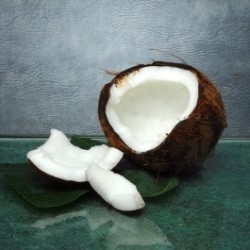
A new drug consisting of Medium Chain Triglycerides (MCT’s) has been approved by the FDA for the treatment of Alzheimer’s disease. In one remarkable study, MCT’s produced improvement in cognitive function after a single dose. Fortunately, expensive prescription MCT-based drugs aren’t really necessary. By far the largest natural source of MCT’s is found in coconut oil. Coconut oil is composed predominately of MCT’s, amounting to about 63 percent of the total. Coconut oil is the source of the MCT’s used in Alzheimer’s studies and to produce pharmaceuticals.
The fundamental problem associated with Alzheimer’s disease is the inability of the brain to effectively utilize glucose, or blood sugar, to produce energy. Alzheimer’s is now often referred to as Type III diabetes. This defect in energy conversion starves the brain cells and weakens their ability to withstand stress.
Glucose is the primary source of energy used by all the cells in the body. We get glucose from carbohydrates in our food. When food is not eaten for a time, such as between meals, during sleep, or when fasting, blood glucose levels fall. To maintain the energy needed by the cells, fatty acids (fat molecules) are released from our fat cells. Like glucose, fatty acids can be burned to produce energy. This process works well for the body but not for the brain.
When blood glucose levels fall, the brain needs another source of energy to function and to survive. This alternative fuel source comes in the form of ketone bodies or ketones, a special type of high-energy fuel produced from fat stored in the liver specifically to nourish the brain.
In Alzheimer’s disease, brain cells have difficulty metabolizing glucose, the brain’s principal source of energy. Ketones bypass this defect in glucose energy metabolism. The ketogenic diet has been used therapeutically for over 90 years to treat another brain disorder: epilepsy. Since the ketogenic diet proved useful in correcting the brain defects associated with epilepsy, researchers began to investigate its application with other brain disorders. Initial studies with neurodegenerative disorders such as Parkinson’s disease, ALS, Huntington’s disease, traumatic brain injury and stroke have shown that the ketogenic diet can provide symptomatic relief to a broad range of brain disorders. Two tablespoons of coconut oil found in any grocery store can produce enough ketones to have a significant effect on brain function.
In animal studies ketones are shown to reduce the amount of Alzheimer’s-like plaque that forms in the brain and improve performance on visual-spatial memory tasks, increase the ability of learning tasks and improve performance in short-term memory.
Mary Newport, MD, coined the term “coconut ketones” to describe the use of MCT’s, and specifically coconut oil, to elevate blood levels of ketones. For therapeutic purposes a total of 5 tablespoons (74mL) a day taken with meals is suggested, divided among three meals. For prevention take 2-3 tablespoons (30-44mL) daily.
While incorporating coconut oil into the diet can have a remarkable effect on brain health, coconut ketones alone are not the complete solution. Diet also affects brain health. An improper diet can sabotage the beneficial effects produced by coconut ketones. Some foods and food additives promote neurodegeneration, while healthful foods support brain regeneration.
Excerpted portions from an article by Dr. Bruce Fife, naturopathic doctor, certified nutritionist and director of the southern Colorado chapter of the Weston A. Price Foundation, a nonprofit dedicated to nutritional education. He is currently the president of the Coconut Research Center, a nonprofit organization dedicated to educating the public and the scientific community on the nutritional and health benefits of coconut oil. He is author of The Coconut Oil Miracle, The Palm Oil Miracle, Coconut Lover’s Cookbook, Cooking with Coconut Flour: A Delicious Low-Carb, Gluten-Free Alternative to Wheat and Eat Fat, Look Thin.
by Anna Lee, CH
